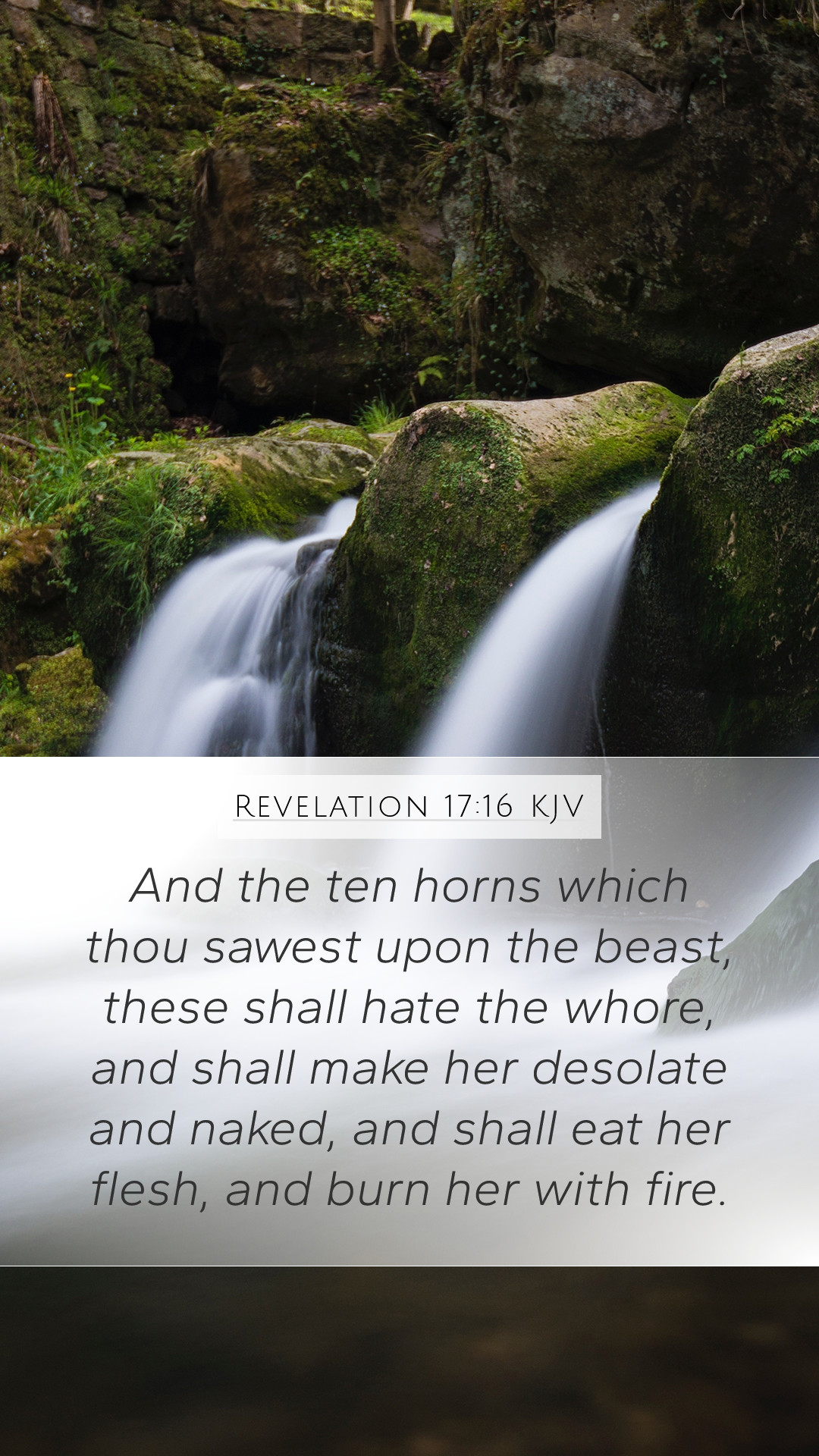Understanding Revelation 17:16
The Bible verse Revelation 17:16 states: "And the ten horns which thou sawest upon the beast, these shall hate the whore, and shall make her desolate and naked, and shall eat her flesh, and burn her with fire." This verse is pivotal in the Book of Revelation, and its meaning requires careful analysis to understand the context and implications of the imagery used. Below we explore the insights from various public domain commentaries.
Bible Verse Explanation
This verse describes a dramatic scene in which the ten horns—representative of ten kings or kingdoms—are seen turning against the “whore,” a symbol of Babylon which represents corruption, idolatry, and opposition to God. These kings will bring about her destruction, illustrating the concept that earthly powers sometimes become agents of divine judgment.
Insights from Commentaries
-
Matthew Henry's Commentary:
Henry emphasizes the contrasting roles of the beast's horns. Originally, they support the whore, but the prophetic imagery reveals that these powers ultimately turn on her. This transition reflects the volatility of political alliances and the ultimate sovereignty of God in using earthly powers for His purposes. Henry notes, "It shows that the security of all worldly grandeur and power is but a delusion."
-
Albert Barnes' Notes:
Barnes highlights the suggestive nature of the imagery, particularly pointing out that this is a fulfillment of God's judgment. He explains that the whore symbolizes a corrupt religious system, and her downfall illustrates the triumph of true faith over falsehood. Barnes elucidates that, "God will cause those who have supported any form of corruption to rise up against it."
-
Adam Clarke's Commentary:
Clarke offers a unique perspective on the human elements behind the imagery, suggesting the psychological and moral decay among nations and leaders. He posits that the ten kingdoms ultimately recognize the destructive nature of their alliances with the whore, leading them to abandon her. Clarke writes, "This is an emblem of the complete rejection of false religion by the very nations who promoted it."
Thematic Elements
In Revelation 17:16, several significant themes can be identified:
- Destruction of False Religion: The passage emphasizes a critical turning point where false religious systems face judgment. This serves as a reminder of the temporary nature of earthly powers.
- Divine Sovereignty: It illustrates God’s control over historical and political events, reassuring believers that no matter how powerful a corrupt system may seem, it is ultimately subject to divine judgment.
- Moral and Political Alliances: The shifting allegiances reflect the unpredictable nature of human alliances when contrasted with the constancy of God’s plan.
Application and Reflection
For modern believers, Revelation 17:16 serves as a warning against the dangers of corrupt influences and the importance of aligning with God’s truth. It challenges us to examine our alliances, be they political, social, or spiritual, and consider whether they reflect God’s values.
Cross References
- Isaiah 47:1-5: This passage discusses the downfall of Babylon, drawing parallels with the symbol of the whore.
- Daniel 7:24-25: Echoes the themes of kings and kingdoms in opposition to God’s people.
- Revelation 18:10-20: Further illustrates the destruction of Babylon and the reaction of the nations.
Conclusion
Revelation 17:16 is a profound reminder of the temporary nature of worldly power and the certainty of God’s ultimate justice. In our study of Scripture, it is essential to seek biblical exegesis that reveals the deeper meanings behind these prophetic images. This reflective approach not only enhances our understanding of Scripture but also prepares us to apply these lessons in our daily lives.
As you delve into Bible study groups or online Bible study resources, consider the significance of such verses. Bible study guides that include historical context, in-depth analysis, and clear applications can greatly enhance your understanding of difficult Bible passages like Revelation 17:16.


